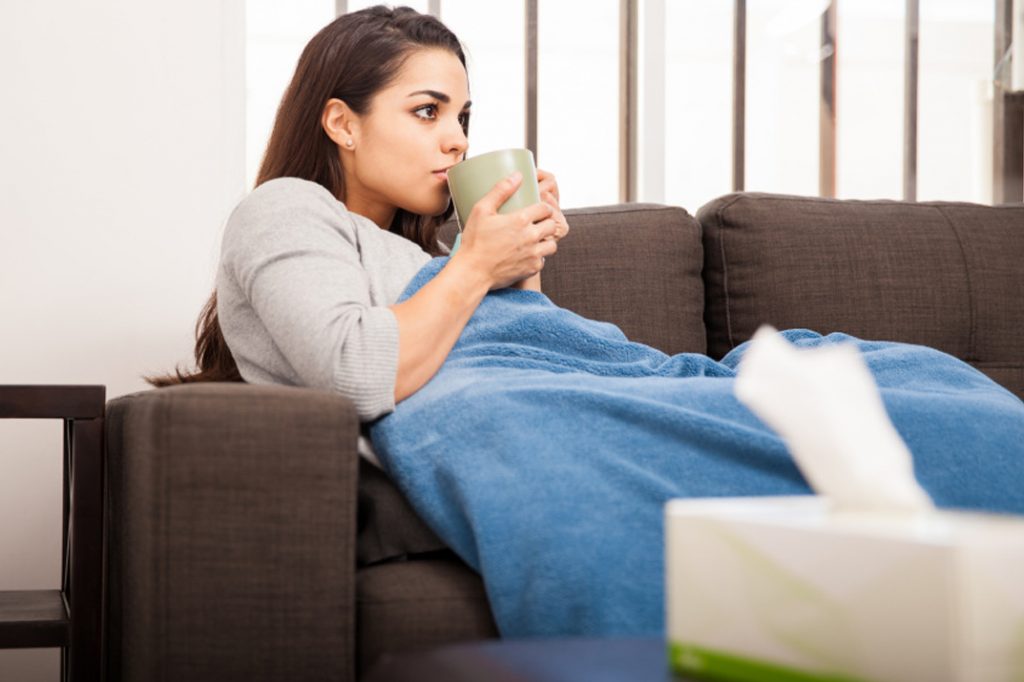
Our country, our world, is in crisis caused by a teeny, tiny invisible particle called the coronavirus. Different strains of the coronavirus have lived among us forever in the form of colds.
Influenza (flu) is caused by a different virus, the influenza virus, Types A and B. Typically, when person comes down with a cold or flu, it may knock them down for a few days (with a cold) or a couple of weeks (with the flu). Scientists develop a flu vaccine each year against the influenza strain expected to affect the globe. This vaccine helps prevent or lessen symptoms if a person contracts the flu.
Many people refuse to get the flu shot because a) they never get sick, b) the vaccine causes them to get the flu, c) they don’t have time, d) the flu isn’t a big deal, what’s a little stomach ache?
Briefly, let me address those excuses.
a) If you never get sick that’s amazing. However, you could still carry the virus which can cause the loved ones around you to become ill.
b) The flu vaccine does not contain a live virus. It cannot cause you to get the flu. Sometimes you may experience a slight discomfort, but that’s not the flu.
c) It takes about 20 minutes to run into your local pharmacy or healthcare clinic to get your shot. It takes about two weeks to recover from the flu.
d) There is misinformation about exactly how we define the flu. Influenza is not the stomach flu, which is often norovirus. Influenza affects one’s respiratory system and causes fever, body aches, chills, headache, cough. I’ve had it a couple times and it is not a place I want to visit again.
It is important to get your flu vaccine each year to help prevent the spread of the virus. So many people are at risk of serious complications if they get the flu and many of these individuals are not able to get the vaccine for a variety of reasons. In fact, last year 34,000 people died from the run-of-the-mill flu that so many people seem to downplay. The flu vaccine helps prevent these unnecessary deaths by providing herd immunity. What a great way to contribute to your community.
So, what does this have to do with COVID-19?
Annual influenza is a mutation of a strain of the influenza virus familiar to the experts. That’s how they are able to develop a vaccine. However, COVID-19 is a strain of coronavirus that is unfamiliar to public health officials: It is “novel”. There is no vaccine. They don’t know how it will affect the population. They don’t know if it will be a recurring public nuisance like influenza and colds. They don’t know why kids aren’t becoming ill (yet). They don’t know exactly the rate of deaths per infection, though right now it seems to be much higher than the typical flu, which is frightening.
Here’s what we know so far as of this writing. Research is ongoing and each day we learn something new. (The following information is provided by the CDC.)
It seems to be primarily spread by respiratory droplets. Yes, you can get it from surfaces, but it is more likely the guy sitting next to you on the plane coughing and sneezing for ten hours who is spreading the disease. (Yes, that really happened to me recently. Yuck.)
Those with underlying illness are most at-risk for severe symptoms; heart disease, respiratory issues, diabetes, autoimmune diseases, etc. In fact, those are the same people at risk for the regular-everyday-flu that we often dismiss.
As of now, we don’t really know how many people will die when they contract COVID-19. Many people do not present with symptoms, therefore they don’t report their illness. But those who do report their illness and have a severe bout of COVID-19 are typically elderly populations and/or have an underlying issue. They have a higher incidence of death as well, compared to the flu. Therefore, the numbers are difficult to assess fully. Which is precisely why we are taking all the precautions necessary to prevent spread. The unknown is a great impetus for action!

Prevention, Prevention, Prevention
What can you do to help prevent the spread of this illness? There is no single answer like, say, a vaccine, however there are steps you can take to prevent community spread. In fact, these are steps that should be followed to prevent colds, flu, and norovirus all the time. Seriously. I mean it.
Wash your hands frequently
Soap-and-water works by removing the bacteria and viruses. The temperature of the water is irrelevant. What matters is spending at least 20 seconds scrubbing both hands thoroughly. (Sing Happy Birthday or the ABC’s twice through. That is what we teach our elementary students about good hand hygiene.) When drying your hands, use a clean cloth or paper towel.
Encourage your family members to wash their hands frequently: Before and after toileting, when returning home from each activity, before and after preparing and consuming food, after blowing your nose. Basically, use common sense. To prevent dry skin, use lotion after cleansing. These habits should be part of one’s daily routine each day, even when we are not fearing COVID-19.
Hand sanitizer, which should be 60% alcohol, works by killing the bacteria and viruses. This is a great option for individuals who travel, who commute to work, or just don’t have access to a sink.
Don’t hoard masks
Most people do not understand how to properly use masks, therefore they are not useful. More importantly, professionals who need the masks are unable to access them. My husband is a veterinary surgeon and is finding it difficult to stock masks to do his work. If we want to prevent the spread of COVID-19, hoarding masks is doing more harm than good.
If you’re sick, stay home
Even though you may feel it’s okay to “tough it out” and go to work, school, or the gym when you are sick, you are exposing others to your illness. Granted, it may be “just a cold’, but when individuals are sick with “just a cold’, they are more susceptible to contracting other viruses due to a weakened immune system. In other words, colds can make people more susceptible to contracting COVID-19.
Social distancing is a new buzzphrase. Stay 6 feet away from others, if possible, and avoid crowds.
Be sure to have about two weeks worth of necessary items at home in case you can’t leave your house due to illness. Medication, food, cash… It is very likely you won’t need it, but it will give you peace of mind.

Achoo
If you have a cough or the sneezes, do not use your hand as a barrier. Please. Use your elbow instead. On my long-haul flight in January, the guy next to me coughed into his hand for the entire ten hours. Then he opened and closed his tray, went to the bathroom repeatedly, and reached up to adjust the fan above his head. Then he asked to borrow my pen. When he proceeded to hand it back to me, I told him it was a gift and to keep it. (I also recommended he see a healthcare provider upon landing.) Think about all the things your hands touch. By using your elbow instead of your hands, you are decreasing the odds of others becoming infected by your “germs”.
When you use a tissue to sneeze or blow your nose, throw it away. I keep a little plastic sandwich bag in my purse when allergy season hits to dispose of my tissues until I can access a trash can.
Don’t touch your face
Easier said than done, I know. Most important is to avoid touching your eyes, nose, mouth and ears. The mucus membranes in those orifices offer viruses a quick trip into our body which can cause illness. It takes practice to develop a habit, but over time you will be much more aware of this particular reflex.
Stay as healthy as possible to avoid overtaxing the healthcare system.
The flu vaccine does not prevent COVID-19. However, it does help prevent or lessen the symptoms of influenza. This is important because the flu is a very serious illness in and of itself. When there is a way to help prevent an illness, it is smart to do so. We don’t want to overtax precious resources such as hospital beds, healthcare providers, and medical equipment to treat a preventable illness. Right now, healthcare providers need to focus on COVID-19. So if you haven’t already — and you are able — get your flu vaccine.

Listen to your local public health officials and healthcare providers
Everyone has an opinion. Everyone knows “someone who knows something”, including myself. The bottom line is, listen to your local public health experts and your personal healthcare provider. What are they advising in your own community? Even politicians are offering their own medical advice when they are wholly unqualified. Honor the community restrictions, honor the medical advice.
Let’s take a collective deep breath
People are feeling quite distressed over COVID-19. This affects our mental and emotional health. Individuals are concerned about not only their health, but also finances. We are inundated with information.
Here is my advice. Take a deep breath. Focus on what you can do to help prevent your family from becoming ill and not what is out of your control. It is perfectly normal to worry, but try not to let it consume you. Take a walk on a beautiful sunny day, buy a bouquet of flowers for your kitchen, start a gratitude journal. No, this won’t keep COVID-19 from infecting your body, but by decreasing your stress level you can help keep your body healthier and your immune system stronger.
We are all in this together. Check in on your neighbors. Share resources if necessary, like toilet paper and hand sanitizer, which people have been hoarding. And if you have any health concerns, contact your healthcare provider and your local Department of Public Health. If you are looking for general information, try not to over burden the phone banks of those working tirelessly to solve this public health issue. The CDC website offers a plethora of information. Local hospital systems and healthcare providers also have information on their websites.
Take care out there!
Science-based resources:
Centers for Disease Control and Prevention
American Public Health Association Informational Handout
Your Local Public Health Department
How to Tell if You Have the Flu, Coronavirus,or Something Else (This is not a science publication, however the article is based on research gathered from science resources.)
Watch these documentaries:
Pandemic is an informational documentary series on Netflix about those who dedicate their lives to preventing pandemics.
National Geographic’s American Experience: Influenza 1918.
(Photos from Adobe Stock)

